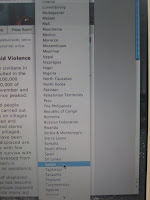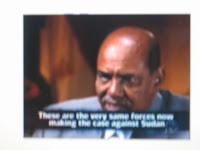


The Human Rights Watch is another organization that is dedicated to poverty-stricken countries worldwide.
“Human Rights Watch is dedicated to protecting the human rights of people around the world.
We stand with victims and activists to prevent discrimination, to uphold political freedom, to protect people from inhumane conduct in wartime, and to bring offenders to justice.
We investigate and expose human rights violations and hold abusers accountable.
We challenge governments and those who hold power to end abusive practices and respect international human rights law.
We enlist the public and the international community to support the cause of human rights for all.”
There is a section that goes into more detail to describe who what where when why and how they help.
They have many programs in Africa including dedicated efforts to Darfur. The Africa home page has a list of briefing papers and publications that discuss stories about Africa. Many are on Darfur.
The actual “Darfur in Crisis” page is very informative. It’s made up of current stories specifically about Darfur. There are also a list of links along the side of the page including a background section with a map and a Q & A page, how you can help and recent reports from the area.
The Q & A section is very informative and covers a lot of the basic questions people may have about Darfur.
There is also a part about what you can do in Darfur. Well worth checking out. Most of the things do not involve donating money but helping to take action. There are detailed descriptions for all of the easy steps listed below:
“Inform yourself about Darfur
Write to your local newspaper
Hold a video screening
Write to the Members of the UN Security Council (addresses below)”
There are many issues that they encourage you to discus in your letter to the UN.
There is also the ability to see if you were living in the United Kingdom what you could do to help.
































